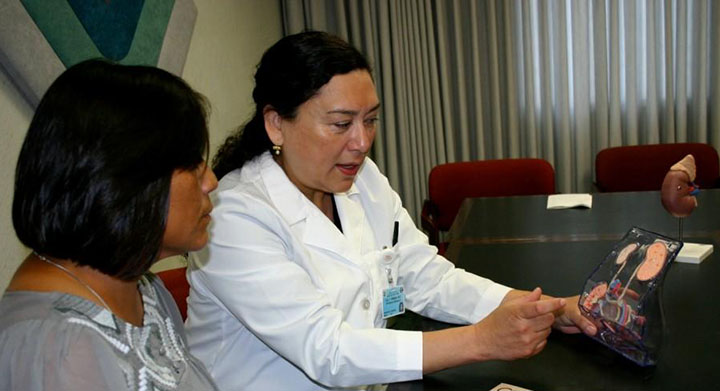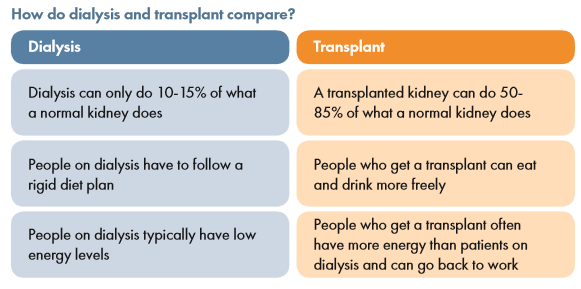You or someone you know may have just been diagnosed with kidney disease. You may have just started thinking about your options or you may be close to choosing one. You may have questions such as "Why did my kidney fail?" "Should I stay on dialysis?" and "Is transplant for me?" Below are answers to these questions and more.
What are kidneys and what do they do?
Kidneys are small organs on the left and right side of the spine that remove waste and extra fluid from the blood. Kidneys also make urine, control blood pressure, and help keep bones healthy.
What is kidney disease?
Kidney disease, also called chronic kidney disease (CKD), happens when the kidneys are damaged and don’t work well. When kidneys work poorly, waste builds up to unsafe levels in your body, threatening your life, and increasing your chance for a heart attack.
The 3 most common reasons for kidney disease are:
- Diabetes
- High blood pressure
- Polycystic kidney disease (a genetic disease where non-cancerous fluid-filled sacs grow on the kidneys)
The most common symptoms of kidney disease are:
- Confusion
- Nausea and vomiting
- Unusual itching
- Metal or bad taste in mouth
- Shortness of breath
- Feeling very weak and tired
Stages of CKD
There are different stages of CKD, called CKD 1–5. Each stage is defined by your kidneys’ GFR or glomerular filtration rate. Your GFR number tells you how much kidney function you have.
The GFR number will go down as your kidneys get worse. Knowing your GFR is important so that you can pick the right treatment option. Talk to your doctor about what would be best for someone in your stage of CKD.
When kidneys fail and reach stage 5 of CKD, it’s called end-stage renal disease (ESRD).

What are ways to slow down kidney disease?
If you’re in an early stage of kidney disease, you can:
- Exercise regularly and stay at a healthy weight
- Avoid smoking and chewing tobacco
- Avoid alcohol often or in large amounts
- Get a yearly physical and know your family’s medical history
- Keep blood-sugar levels under control (especially if you’re diabetic)
- Keep blood pressure under control
Talk to your doctor about other ways to slow down your kidney disease.
There are 2 treatment options:

Dialysis: A filtering machine or special fluid that removes waste out of your body.
- Hemodialysis: A machine cleans your blood at either a dialysis center several times a week, or at home every day or night.
- Peritoneal dialysis: A fluid is put in your belly to clean your body and then removed several times a day and overnight.
Many dialysis patients feel tired and weak before and after treatments. On dialysis, you have to follow a strict diet, drink less fluids, and take medicine. You might also have dialysis-related health problems such as muscle cramps and heart problems. Also, dialysis can take a lot of time, often 9–12 hours a week.
Is getting dialysis the same as having a working kidney?
No. A working kidney can remove fluid and waste 24 hours a day. Dialysis can only do 10–15% of what a normal kidney does. A transplanted kidney can replace up to 50–85% of normal kidney function.
Transplant: There are 2 types of kidney transplant:
- Living donor kidney transplant: A surgery where doctors put a kidney from a living person into someone whose kidneys no longer work.
- Deceased donor kidney transplant: A surgery where doctors put a kidney from someone who has died into someone whose kidneys no longer work.
Who can get a transplant?
Many patients with kidney problems (including those over age 70) can get a transplant. Talk to a doctor to see if you’re able to get a transplant. You may not be able to get a transplant, for example, if you have a certain health condition.
Is it better to have a transplant near the start of dialysis?
Yes. A transplant before starting dialysis or within 2 years of starting dialysis usually works the best and prevents health problems from being on dialysis for a long time.
